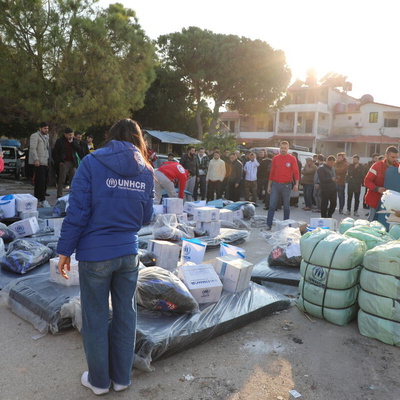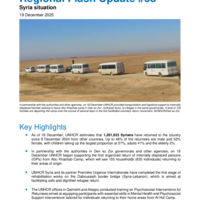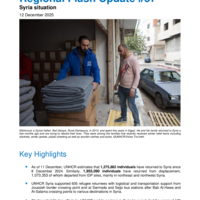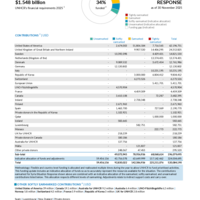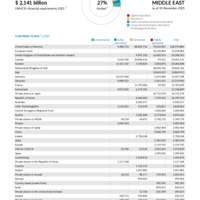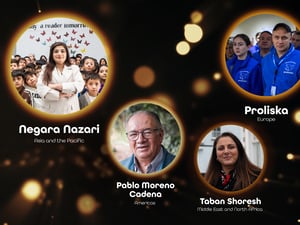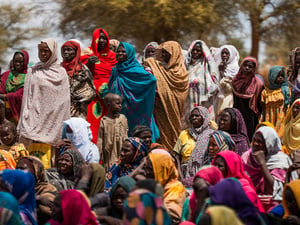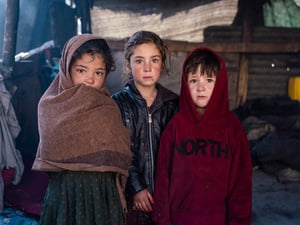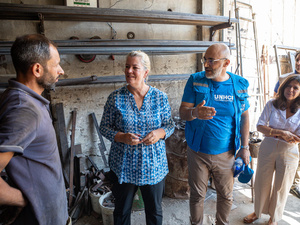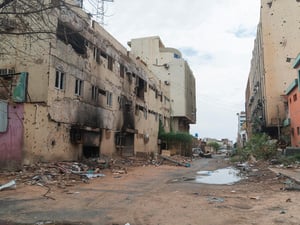Middle East and North Africa
Middle East and North Africa

Regional overview
The Middle East and North Africa continues to face both new and protracted displacement crises, driven by complex political, economic, and security dynamics. Declining donor support and shrinking protection space have heightened risks for displaced populations, including limited access to basic services, barriers to legal stay, and increased risks of arrest, detention, deportation, and refoulement. By mid-2025, more than 17.8 million people were forcibly displaced or stateless across the region.
Despite these challenges, new opportunities for solutions are emerging. The Syria crisis remains the largest displacement situation, with 7.4 million people displaced within Syria and 4.5 million refugees in neighboring countries, including 2.5 million in Türkiye. The political transition since December 2024 has reshaped conditions inside Syria and regional dynamics, enabling significant voluntary returns of refugees and internally displaced persons.
Ongoing emergencies in the Middle East and North Africa
Text and media 6
Syria emergency
An offensive by armed groups on 27 November led to the overthrow of the former government on 8 December, sparking hopes for an end to the world’s largest displacement crisis alongside uncertainty over the country’s immediate future. Before these dramatic events, over 13 million people remained displaced inside Syria and in neighbouring countries following more than 13 years of crisis.
UNHCR's work in the region
In response to growing requests for support with voluntary returns, UNHCR adopted its Operational Framework for the Voluntary Return of Syrian Refugees and IDPs in February 2025. The process is gradual and voluntary, with enhanced counselling, protection monitoring, assessments of voluntariness, and return grants to ensure informed decisions. The Regional Refugee and Resilience Response Plan (3RP), co-led with UNDP, remains the main coordination platform for the Syrian refugee response and now includes a return-related addendum to guide safe and dignified returns while sustaining support for host communities. Syrian refugee return will take years, making continued investment in host countries and inside Syria essential.
In North Africa, mixed movements, shrinking protection space, and rising anti-foreigner sentiment heighten risks for people on the move. The conflict in Sudan has displaced over 3 million people, including 1.5 million to Egypt, while socio-economic hardship and entry restrictions drive onward movements into Libya and returns to precarious conditions. Instability in Mali continues to displace people into Mauritania, straining local resources. Yemen hosts over 60,000 refugees and asylum-seekers, mainly from Ethiopia and Somalia, while more than 4 million remain internally displaced, facing severe floods, armed violence, and economic collapse.
UNHCR’s approach rests on three pillars: ensuring access to safety, creating a supportive protection environment, and enabling durable solutions. Across the region, UNHCR applies a route-based approach to mixed movements, strengthening state protection, referral systems, and inclusion in national services. Voluntary repatriation, resettlement, and complementary pathways remain priorities, alongside efforts to prevent statelessness through birth registration and gender-sensitive interventions.
Amid severe global funding cuts, UNHCR has reprioritized life-saving protection and assistance while seeking development financing and private sector investment to sustain resilience and inclusion. Partnerships with development actors aim to integrate refugees into national plans in line with the Sustainable Development Goals and the Global Compact on Refugees. UNHCR also maintains offices in Gulf Cooperation Council countries focused on fundraising and donor engagement, mobilizing nearly USD 36.6 million by July 2025.

